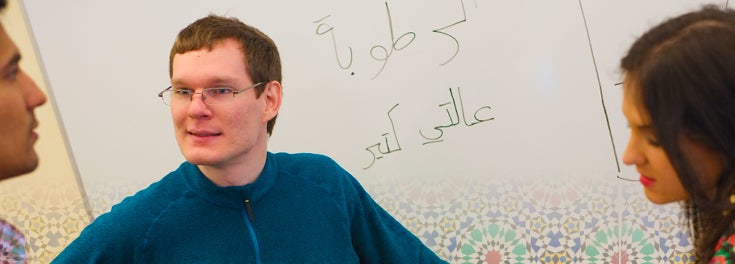
URI senior Austin Demers didn’t think that the study of a foreign language could influence the way her brain would process written information. But now she (and her eye doctor) knows that it can.
Last semester, the biological sciences honors student enrolled in the new intensive Arabic language course taught by Assistant Professor Alexander Magidow. The six-credit class met from 8 to 10 a.m., five days a week and it was not a class to be missed.
We include elements to enrich understanding of the language well beyond ‘standard’ Arabic. We are teaching this as the living language that’s spoken by about 300 million people worldwide — including many Rhode Islanders. -Professor Alexander Magidow
One day, Austin went for an eye exam and came back with more than a prescription. “At the doctor’s office I started reading the eye chart and the nurse kept looking at me funny. Then when I saw the ophthalmologist and read the chart, she looked at me and said ‘Are you reading that chart from right to left?’ — and to my surprise, I was.
“Since taking this class, if I don’t see whole words in English, my brain shifts to just read the characters from right to left,” Austin says. “It’s just become so natural.”
This was a surprise that delights Professor Magidow. “After just four months in class, Austin was so comfortable with Arabic that she defaulted to reading from right to left — and thought nothing of it. If you’re a foreign language teacher, this is great, but for an optometrist it’s not so helpful.”
“Our students seem to feel that they become a part of the language,” says the professor who joined URI’s new Islamic and Mediterranean Studies program in September 2013. If Arabic’s not your thing – or you already know it – you might be interested in such related courses as Islamic Religion and Politics, Islamic History and Culture, Islamic Political Thought, Islam and Democracy, Islam and Modernity, and Quranic Studies and Exegesis.
“We include elements to enrich understanding of the language well beyond ‘standard’ Arabic. We are teaching this as the living language that’s spoken by about 300 million people worldwide — including many Rhode Islanders. So if my students go to the nearby Pita Pocket shop and the owner is from Syria, they can speak to him in a natural way,” the professor says.
Like Austin, many of the students in this course and the introductory Arabic classes are not language majors. They are majoring in theater, engineering, business, environmental studies, political science and more.
“I’m really glad that these students make time in their schedules to do something that they find personally fulfilling,” says Professor Magidow. “They are learning an important language in a way that will help them travel safely worldwide.”
Austin learned about the course from a friend from Lebanon who showed me her Arabic homework. “I was amazed at how beautiful it looked, I wanted to know more, and I wanted to challenge myself. So I found myself taking Arabic at 8 a.m. every day, doing homework for two hours every night, and I love it. I wouldn’t trade it for anything,” says Austin — who one day plans to practice medicine with and for people all over the world.
Pictured banner and above, from left to right: mechanical engineering major Saad Ilyas, history major Andrew Oaklund, and political science major Katie Gignac. The whiteboard reads, with a typo, “The humidity is very high.”
